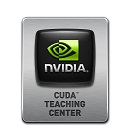Difference between revisions of "GPU610/DPS915"
(→The Workshops) |
|||
| Line 33: | Line 33: | ||
*# [https://scs.senecac.on.ca/~gpu610/pages/workshops/w9.html Matrix Product using Streams] | *# [https://scs.senecac.on.ca/~gpu610/pages/workshops/w9.html Matrix Product using Streams] | ||
*# [https://scs.senecac.on.ca/~gpu610/pages/workshops/w10.html CUDA to OpenCL] | *# [https://scs.senecac.on.ca/~gpu610/pages/workshops/w10.html CUDA to OpenCL] | ||
| − | + | * Grading | |
| + | The window for submission of each workshop is two weeks. The penalty for late submission is 50% of the workshop mark. | ||
== The Project == | == The Project == | ||
Revision as of 10:38, 31 August 2012
GPU610/DPS915 | Student List | Group and Project Index | Student Resources | Glossary
Please help make this page resourceful for all GPU610/DPS915 students to use!
Contents
[hide]Course Descriptions
GPU610 - Parallel Programming Fundamentals
- Modern GPU (Graphics Processing Unit) technology supports massively parallel computations, which complements the serial processing capabilities of CPU technology. This course teaches students how to read, write, and debug programs that use both CPU and GPU technology. Students learn to reorganize existing programs into serial code that runs on the CPU and parallel code that runs on the GPU. Students also study cases that have benefited from CPU+GPU programming.
- Course Outline
DPS915 - Introduction to Parallel Programming
- Modern GPU (Graphics Processing Unit) technology supports massively parallel computations, which complements the serial processing capabilities of CPU technology. This course teaches students how to read, write, and debug programs that use both CPU and GPU technology. Students learn to reorganize existing programs into serial code that runs on the CPU and parallel code that runs on the GPU. Students also study cases that have benefited from CPU+GPU programming and develop a CPU+GPU application for a client.
Common Material
External Links
The Workshops
- The workshops provide timely opportunities to implement some of the material covered during the lectures. Each workshop is graded and all submissions are through Moodle.
- Detail Specifications
- Grading
The window for submission of each workshop is two weeks. The penalty for late submission is 50% of the workshop mark.
The Project
The penalty for late submission is 30% of the assignment mark. The penalty for resubmission, in the event that the original submission was not workable is 50%. The due dates are posted in Moodle. All submissions are to be made through Moodle. |
Evaluation
- Assignment 30%
- Workshops 20%
- Test 20%
- Exam 30%
Final Submission Requirements
- Under construction
Resources
- Software Support
- Wikis
- Subversion
